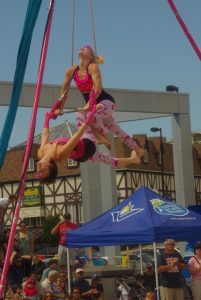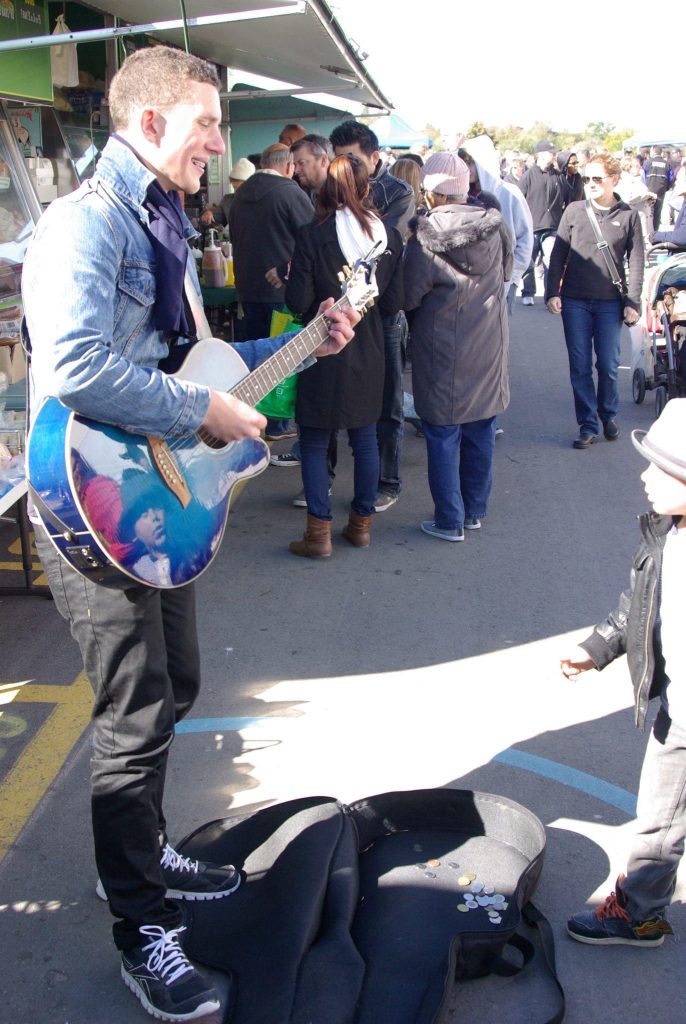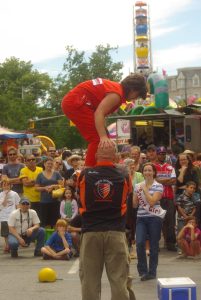Chapter 8
Thanks for Making My Day, Busker!
Warm up Questions
- Do you perform any tricks or can you play an instrument?
- Do you pay attention to food, architecture, history, or something else when you travel to a new city?
Reading
Listen to the reading shown below.

-
- A busker is someone who performs in a public place, like a street corner or town square, for spare change. A busker may do any number of amusing tricks or play a musical instrument. They sing, perform magic, swallow fire, or demonstrate acrobatics all to entertain passersby and receive some money in exchange. They may or may not have related goods for sale. When was the last time you saw someone on the street corner juggling knives? Did you give them some money for their talent? Working as a busker aids in personal and professional growth for the performer.
- Performing for the public on a regular basis is demanding. It demands both hours and hours of practice and a large repertoire, or collection of material. Once performing on the street frequently, skill evolves, and buskers become even better performers. Performing daily involves repetition; repetition improves skill. In his book The Tipping Point, author Malcolm Gladwell notes that the difference between mastering a skill and merely being good is about 10 000 hours of practice. Buskers often spend long hours performing, which directly affects their chance of attaining mastery of their skill.
- Performing on the street rather than the stage means the busker is accessible. This accessibility provides a unique opportunity for feedback and conversation with the audience. It is hard to make a prediction about how the public will react. People may make a request for a song or a trick, they may join in, or they may even challenge the performer. The performer’s reaction to the interaction must always be professional. Conversely, if unimpressed, members of the public may not acknowledge the performer let alone throw them some spare change. Hence, the busker must have a brave face in order to keep feelings related to rejection hidden internally. The diversity that they experience in the audience helps toughen the performer; meaning that they are able to move on quickly after an undesirable interaction.

- Being a street performer helps to develop both character and identity. Strength of character comes from the controversy over buskers. Each time they are questioned over why they are working on the street rather than in a performance hall, they must review their reasons for this choice. This issue becomes settled if a busker considers himself as an entrepreneur rather than someone on the fringes of society. Over time, they may also become known as the person that performs on the street. They adopt this as part of their identity.
- It is the norm for a busker to set their own hours and schedule as well as where they work. Although some cities or venues enforce regulations for street performers, like distancing them from one another within the city, performers can work as often or as little as they wish. Beyond the basic city restrictions, there is little monitoring of the frequency of their show or income. If they abandon the street for a day, they forfeit any income. It is important for the performer to notice trends in foot traffic patterns because that is how they find their audience. Performing regularly also requires the busker to learn new material and keep their equipment and their performance top-notch. Some days the reward of cash may come quickly, and the busker may stop early, but it could just as easily be a long and quiet day which may lead to feelings of depression. Self-employed performers definitely learn to manage all aspects of the business.
- Buskers learn the value of conforming to a regular schedule – same time and same place. This brings another level of reward to the performer. Establishing relationships with the business owners nearby becomes a priority, and they build a network of connections within the city. This is advantageous because they will look out for one another. In a very practical way, the performer may gain access to fresh water and other facilities during the day. The performer may also increase the traffic to an adjacent business-like a nearby café or a busy bakery where people would be happy to stay for another drink or wait in line because they are being entertained.

- Street performers bring life to the city they are based in by adding personality to the streets they work in. They often create special memories for tourists and enhance the experience of visiting any city. They really do create a win-win situation for themselves and the places where they work. Jacob Davis, who spent 6 years playing guitar and singing for the patrons at the farmer’s market, can share a long list of positive outcomes from his days as a busker. He says that “Busking was a great way to learn about people.”
Comprehension Questions
Answer the following questions in complete sentences.
- What is a busker?
- Describe one way that a busker may interact with the audience?
- Why does the writer describe the busker as self-employed?
- How does a busker benefit from being surrounded by businesses?
- How could the audience reward the busker?
- When was the last time that you saw a busker? What impression or feeling did they give you?
- Would you encourage someone to perform on the street? Why or why not?
Vocabulary Words
Listen to the pronunciation of the words listed below.
accessible
acknowledge
affect
based
conform
controversy
definitely
depression
distancing
enforce
evolve
goods
internally
issue
norm
outcome
prediction
priority
restrictions
trend

